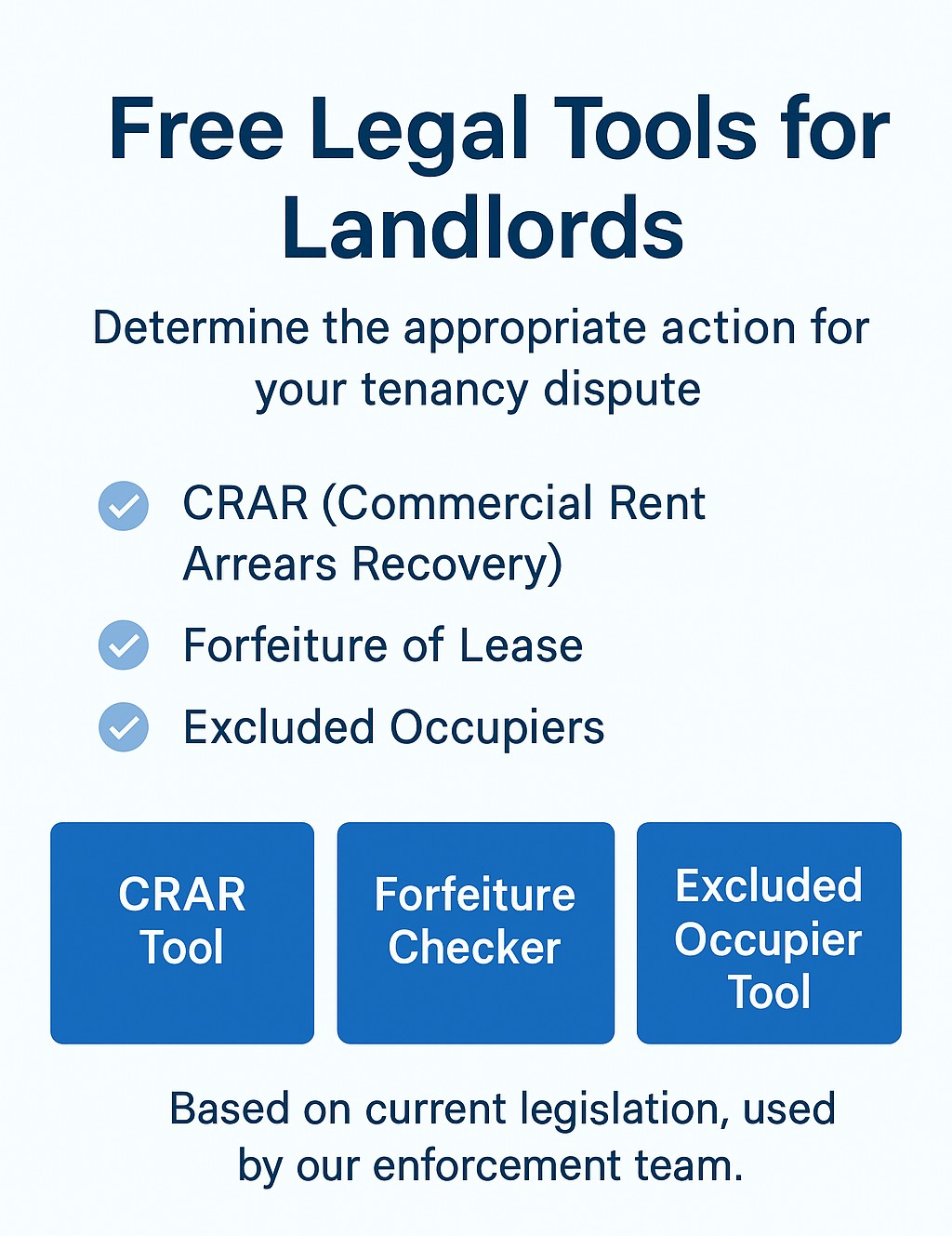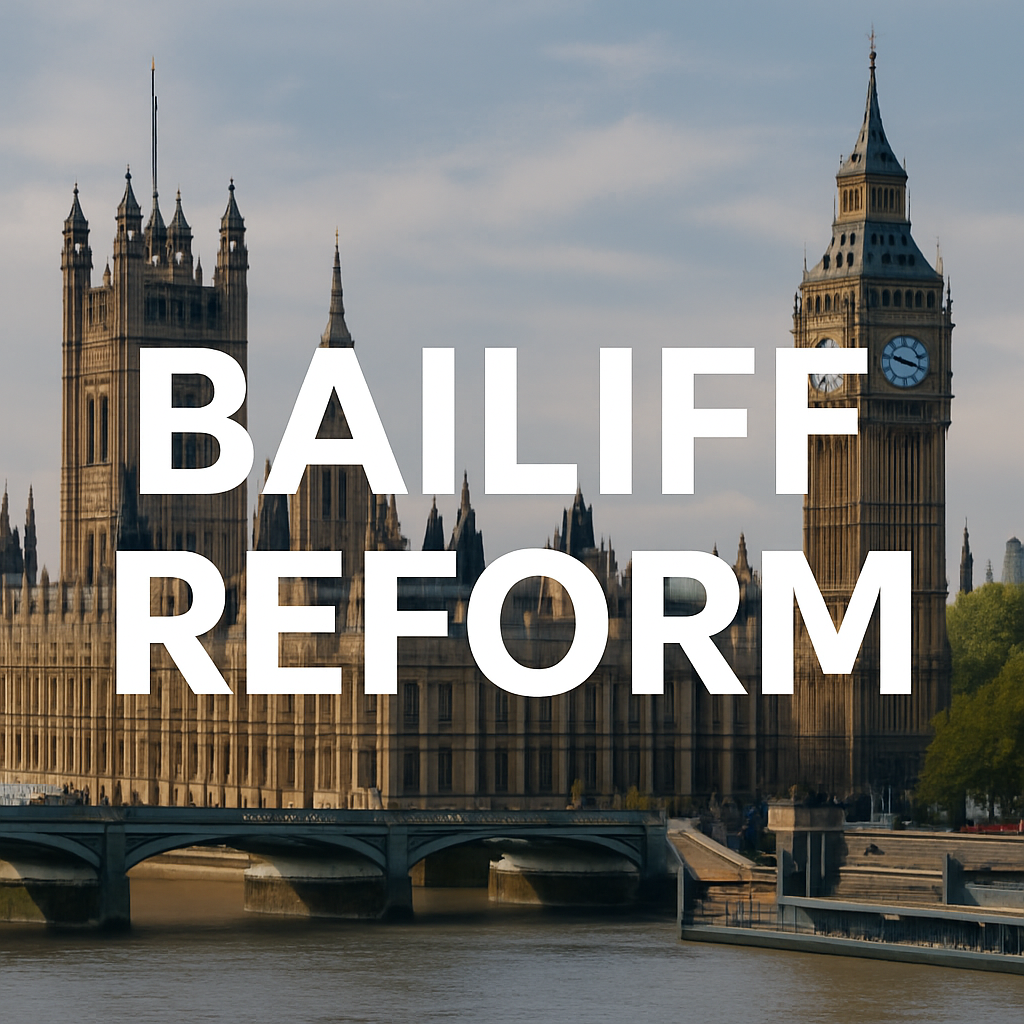NEWS and Updates
Ending Temporary Accommodation: Guidance for Landlords and Councils

Overview:
This guide explains in plain English when and why occupiers of temporary accommodation can be asked to leave, how councils may lawfully end such arrangements, and the legal rights involved. It covers key scenarios under the Housing Act 1996 and the Protection from Eviction Act 1977, including the special status of licenses granted to homeless applicants, the concept of excluded occupiers versus basic protection, and what legally defines a hostel. Each section uses simple language while remaining accurate to the law.
When Can Occupiers Be Asked to Leave Temporary Accommodation?
Temporary accommodation is by nature short-term. Occupiers can be asked to leave once the temporary arrangement has run its course or certain conditions are met. Common situations include:
- End of the Homelessness Duty: If the council’s legal duty to house the person has ended (for example, after completing inquiries under the Housing Act 1996 and finding no ongoing housing duty), the occupier can be required to leave. In such cases, the council must give notice but does not need a court order to evict an excluded occupierukbailiffs.co.uk. This is because many people in temporary housing are excluded occupiers (explained below), meaning they are not covered by the usual eviction protections of the Protection from Eviction Act 1977england.shelter.org.uk.
- Expiration of the Agreed Term: Some temporary placements are arranged on a nightly or weekly basis. When the agreed period or license term ends, the occupier can be asked to vacate. The council may extend the stay as needed, but if they choose not to (for instance, because the homelessness application has been decided), the occupier must leave when the agreement expires.
- Suitability of Alternative Housing: If the person has been offered suitable longer-term accommodation (for example, a permanent council or housing association tenancy, or a private rental arranged by the council) and either accepted it or refused a final offer, the council’s duty under Part VII of the Housing Act 1996 can be discharged. Once a suitable final offer is refused or a new home is secured, the council is entitled to end the temporary arrangement. (Under the Housing Act 1996, a main housing duty under section 193 can end if an applicant unreasonably refuses an offer of suitable housing or when they accept an offer.)
- Serious Breach of Agreement: If the occupier seriously breaches the rules of the temporary accommodation (for example, through violence, serious anti-social behaviour, or non-payment of any service charge required), the council may terminate the arrangement early. In practice, the council might try to relocate the person to a different temporary accommodation if its duty continues. However, extreme misconduct could lead the council to decide it will no longer accommodate that person (potentially treating the refusal to comply as making themselves intentionally homeless). Each situation is considered individually, but causing a placement to fail through misconduct can prompt the council to end that placement for the safety and well-being of others.
Why the Council May End a Temporary Accommodation Placement
A local authority will only end a temporary housing arrangement for valid reasons. Below are the key reasons the council may decide to terminate the placement:
- Homelessness Application Decision: The council has completed its inquiries and determined the outcome of the homeless application. If the applicant is found not homeless, not in priority need, or intentionally homeless, the council’s duty to provide accommodation comes to an end. For example, if someone is found intentionally homeless, the council’s duty to accommodate under section 190 of the Housing Act 1996 only requires a short period of temporary housing as a grace periodengland.shelter.org.uk. After giving what is considered a “reasonable opportunity” (often a few weeks) for the person to find other accommodation, the council can cease providing housingengland.shelter.org.uk. In such cases the occupier is usually an excluded licensee with no further right to stay once that period lapsesengland.shelter.org.uk.
- Discharge of Main Duty (Offer of Housing): If the council accepted a main housing duty (under section 193 of the Housing Act 1996, for applicants who are homeless, in priority need, and not intentionally homeless) and has since discharged that duty by offering suitable permanent accommodation, the temporary accommodation will be brought to an end. For instance, if the applicant accepts a social housing tenancy or a 12-month private rental (often referred to as a “private rented sector offer”), the council no longer has an obligation to provide temporary housing. If the applicant unreasonably refuses a final offer of suitable housing, the council can also end its duty, which in turn ends the temporary accommodation provision. The applicant would be given notice that the council regards its duty as discharged due to the refusal.
- Change in Circumstances: Temporary accommodation may end if the applicant’s circumstances change such that they are no longer eligible or in need. For example, if the person secures their own alternative accommodation, leaves of their own accord, or ceases to be eligible for assistance (e.g. due to a change in immigration status or leaving the area), the council can end the placement. Similarly, if the household makeup changes or a review decision alters the duty (perhaps a successful review finding no duty), the council will notify the occupier and end the temporary housing.
- Behaviour and Conduct Issues: Councils expect occupiers to comply with the license or house rules (e.g. not to cause nuisance or damage). If an occupier’s behaviour is unacceptable – for example, violence towards staff/other residents or serious property damage – the council may decide to evict the person from that temporary accommodation for breach of the license terms. Such action might be immediate in severe cases. Even though the Protection from Eviction Act 1977 does not apply to excluded occupiers, councils typically give a short written notice or warning. In cases of dangerous behaviour, the police might be involved to remove the person. (If the council still owes a housing duty, they might try to find another placement, but persistent misconduct can result in no further accommodation if the duty is ended due to the person’s own actions.)
- Property or Lease Availability: Sometimes the reason is practical: the accommodation itself may no longer be available. For example, if the council was using a privately leased flat or a bed-and-breakfast and that arrangement comes to an end (the lease expires or the owner needs it back), the council will end that particular placement. In such cases, if the homelessness duty continues, the council will usually offer a different temporary accommodation instead of completely ending assistance. The termination is of the specific placement, not of the council’s duty as a whole. The occupier would be asked to move to the alternative accommodation provided.
Reminder: When ending a placement, councils should give clear information to the occupier about why it’s ending and what their rights are. In many scenarios (except serious misconduct), occupiers are given a reasonable notice period to arrange their next steps – for intentionally homeless applicants, this is often taken to be around 28 days’ notice, depending on individual circumstancesengland.shelter.org.uk. The Homelessness Code of Guidance advises that a “few weeks” is usually reasonable, but each case must be judged on its own facts england.shelter.org.uk.
Consequences of Overstaying Temporary Accommodation
Occupiers should be reminded that overstaying beyond the permitted time in temporary accommodation can have serious consequences, both legal and practical:
- No Right to Stay: If an occupier remains after the council has lawfully ended the arrangement, they have no legal right to continue occupying the property. For excluded occupiers (which includes most people in council temporary housing placements), the protection of the Protection from Eviction Act 1977 does not applyengland.shelter.org.uk. This means the council or landlord can evict without a court order once any required notice has expiredukbailiffs.co.uk. In practice, security staff or bailiffs may be instructed to change the locks or otherwise remove the person. Overstaying doesn’t grant any new tenancy rights – staying on will not magically convert a temporary stay into a secure tenancy.
- Risk of Immediate Eviction: Unlike a normal private tenant, an excluded occupier who refuses to leave can be removed very quickly. The council should still act lawfully and avoid any breach of the peace, but they are legally entitled to regain possession. They do not have to go through a lengthy court process to get a possession orderengland.shelter.org.uk. In some cases, the council may arrange for enforcement agents to attend on the day the occupier is supposed to leave. Any belongings left behind might be placed in storage or, after a time, disposed of (the council should inform the person of how to collect their possessions if this happens).
- Impact on Future Assistance: Overstaying against instructions can affect the person’s housing options down the line. While each situation is considered individually, a person who refuses to leave temporary accommodation when told may be seen as making themselves intentionally homeless from that point. For example, if the council had arranged a suitable alternative (or given adequate notice to find something) and the person simply refused to cooperate, the council could decide it has discharged its duty. In future homelessness applications, that person’s actions might be scrutinized – a history of failing to vacate accommodation or of being evicted for misconduct could make it harder to get help again. At the very least, it may strain the relationship with the local authority and limit goodwill.
- Broader Impact: When someone stays in temporary housing longer than they should, it can also hurt others. Council temporary accommodations are a limited resource. If one household overstays, that unit isn’t free for another homeless family who might urgently need it. This is why councils stress moving on promptly – it’s not only a legal matter but also about fairness to others in need. For landlords or managing agents, an overstayer might also cause complications with property owners or other residents. In some cases, the police can be involved to remove an occupier for trespass if they refuse to leave after the arrangement ends (though usually the civil eviction process via the council is sufficient).
- Bottom line: It’s crucial for occupiers to understand that once their temporary accommodation is due to end, they should either secure alternative housing or work with the council on any next steps. Overstaying offers no benefit and can lead to forcible eviction, legal consequences for unlawful occupation, and potential difficulties in getting further assistance.
Licenses Granted to Homeless Applicants
Local authorities typically provide temporary accommodation to homeless applicants under a license agreement rather than a tenancy. This is a crucial distinction. A license gives someone permission to occupy a room or property on a temporary, often short-term basis, without granting the full rights that a tenant would have. For homeless applicants, the arrangement is usually as follows:
- Interim Accommodation (Section 188, Housing Act 1996): When someone applies as homeless, the council has a duty to provide interim housing while it makes inquiries, if it believes the person may be eligible, homeless, and in priority need. This is governed by section 188 of the Housing Act 1996. Councils fulfill this by placing the person in temporary accommodation (for example, in a hostel, hotel, or short-term flat) under a license to occupy. The homeless applicant is the licensee, and the council (or sometimes a managing agent) is the licensor. Legally, this is not a tenancy; it’s a personal permission to stay temporarily.
- Duties to the Intentionally Homeless (Section 190): If the council decides the applicant is homeless and in priority need but became homeless intentionally, the main housing duty won’t apply. Instead, under section 190 of the Housing Act 1996, the council must secure accommodation for a short period (to give the person a reasonable chance to find their own housing)england.shelter.org.uk. This accommodation is also provided under a temporary license agreement to the applicant. Again, it’s a license, not a tenancy.
- Excluded License Status: Licenses granted to homeless applicants in these scenarios (section 188 interim accommodation and section 190 intentional homelessness accommodation) are generally regarded as excluded licenses. Case law has confirmed that people in these situations are excluded occupiers not covered by the Protection from Eviction Act 1977england.shelter.org.uk. In other words, the usual rules that protect tenants from eviction (such as the requirement for a court order) do not apply to these homeless placement licensesengland.shelter.org.uk. Even if the accommodation is a self-contained flat, if it’s provided under the homelessness duty on a license, the occupier is treated as an excluded occupier with very limited security of tenureengland.shelter.org.uk. The council can ask them to leave when the duty ends or the license is terminated, without the cumbersome legal process that would be required for evicting a tenant.
- License Agreement Documents: Homeless applicants will usually be asked to sign a license agreement or given a written notice of terms when placed in temporary housing. This document often explicitly states that it is not a tenancy and that the occupier is an excluded licensee. It will lay out rules (for example, no guests after a certain time, requirements to pay any service charge, not to cause nuisance, etc.) and will specify that the accommodation is short-term. For landlords or housing providers working with councils, it’s important to have this agreement in writing. It makes clear to the occupier what their rights and responsibilities are and protects the council/landlord by establishing the limited nature of the arrangement.
- No “Right-to-Remain” Long Term: Because these are licenses for a specific purpose (pending inquiries or a short grace period for the intentionally homeless), the occupier has no right to remain once that purpose is over. The Housing Act 1996 duties in these sections are temporary by design. The council will either end the license once its duty is discharged or, if a longer-term duty applies (see next section), may move the person to a different arrangement. The key point is that a homeless applicant in temporary accommodation should not expect that placement to become permanent housing – it’s a stepping stone in an emergency, not a settled home.
Excluded Occupiers vs. Occupiers with Basic Protection
When it comes to legal protections against eviction, people staying in temporary or informal housing situations fall into different categories. Two important categories are excluded occupiers and occupiers with basic protection. The differences can be critical for landlords and councils to understand, as they determine what procedures must be followed to evict someone.
- Excluded Occupiers: An excluded occupier is someone who is not covered by the full protection of the Protection from Eviction Act 1977. This category is defined by law and includes several types of arrangements. Common examples are:
- Homelessness Licenses: As discussed, a licensee in temporary accommodation provided by a council to a homeless applicant (for example, under section 188 or 190 of the Housing Act 1996) is an excluded occupier by case lawengland.shelter.org.uk.
- Resident Landlord Situations: A lodger who lives with their landlord in the same home (sharing facilities) is an excluded occupier. Because the landlord is resident, the lodger does not have the usual tenancy protections.
- Hostel Residents: Someone living in a hostel (especially a council or charity-run hostel) under a license is typically an excluded occupier. The accommodation is not self-contained and falls under specific exclusions in the law for hostels.
- Holiday Lets and Others: If someone is occupying under a holiday let or truly rent-free arrangement, they can also be excluded. The Protection from Eviction Act 1977 and related laws list these categories explicitlyengland.shelter.org.uk.
- Legal Effect: Being an excluded occupier means the person can be evicted without a court order once their license or permission to stay is endedengland.shelter.org.uk. The landlord or council must still formally terminate the arrangement (usually by giving whatever notice the agreement requires, or at least reasonable notice), but after that, they can simply ask the person to leave. If the person doesn’t go, the landlord can change the locks or use other lawful means to regain possession (peacefully, without assault or harassment)landlordadvice.co.uk. There is no need to serve a Notice to Quit or obtain a possession order from the court for excluded occupiersengland.shelter.org.uk. This drastically simplifies the eviction process – essentially, the occupier’s right to occupy ends when the notice period ends, and they have to go at that time.
- Occupiers with Basic Protection: This category covers people who are not excluded occupiers but also don’t have the full long-term security of a social housing tenant or an assured tenant. They have some legal protection, primarily via the Protection from Eviction Act 1977, but it’s “basic” in that the landlord can still end the agreement fairly easily (compared to a protected or secure tenancy). Examples include:
- Non-Secure Tenants under Homelessness Duties: If a local authority places a homeless family in a council or housing association property while owed the main homelessness duty, they often use a “non-secure tenancy.” This is a tenancy that is excluded from being a secure tenancy (usually by Schedule 1 of the Housing Act 1985, because it’s temporary housing for a homeless household). Such occupants are not excluded from the Protection from Eviction Act – they have basic protectionengland.shelter.org.uk. The council will need to serve proper notice (often a 28-day Notice to Quit) and obtain a court possession order to evict them if they don’t leave voluntarily.
- Private Temporary Tenancies: In some cases, a council might arrange a short-term private let (for example, through a lease with a landlord) for a homeless applicant. Depending on how this is set up, the person might become an assured shorthold tenant (with a fixed term) or simply an occupier with basic protection. A key factor is whether the arrangement was clearly temporary and stated to be a license or non-secure tenancy. If it wasn’t an excluded license and the occupier has exclusive possession of self-contained accommodation, they could fall into the basic protection category (meaning a court order is needed for eviction)landlordadvice.co.uk.
- Other Cases: Occupiers with basic protection also include some tenants who are excluded from the Housing Act 1988 (so not assured or shorthold) but still have PEA 1977 protection. For example, if a landlord lets a property but isn’t resident and it doesn’t qualify as excluded for any reason, yet it’s not an assured tenancy (perhaps because the rent is very high or it’s a company let), the occupant at least has basic protection under PEA 1977.
- Legal Effect: Having basic protection means the occupier cannot be evicted without proper notice and a court orderlandlordadvice.co.uk. The landlord must follow the procedures of the Protection from Eviction Act 1977:
- They must serve a written notice to quit or notice to terminate in accordance with the contract and law (at least 28 days for a periodic license or tenancy, or longer if rent is paid less frequently) before the occupier can be made to leave.
- If the notice period expires and the occupier hasn’t left, the landlord (or council) needs to apply to the court for a possession order and then, if the occupier still will not leave, use county court bailiffs or enforcement agents to carry out the eviction.
- In short, basic protection = court needed for eviction. The occupier is not as vulnerable to immediate lockout as an excluded occupier is. However, they do not have long-term security: the landlord doesn’t need to prove any breach or ground for eviction as would be required for a secure or assured tenancy; they can end the agreement on notice once any fixed term is up or, if periodic, by a notice to quit. But the key is they must go through due process.
Summary of Differences:
- Notice Requirements: Excluded occupier – no statutory notice required (though usually a short reasonable notice is given); Basic protection – written notice is legally required (often 28 days minimum).
- Court Order: Excluded occupier – no court order needed for evictionengland.shelter.org.uk; Basic protection – court order required to evict if the occupier doesn’t leave willinglylandlordadvice.co.uk.
- Examples: Excluded – homeless licensees, lodgers, hostel residents; Basic – non-secure council tenants, some licensees in self-contained units, others not meeting exclusion criteria.
- Legal basis: Excluded status is defined by Protection from Eviction Act 1977 (sections 3A and Schedule) and case law (e.g. relating to homeless applicants) which carve out these exceptionsengland.shelter.org.uk. Basic protection is basically the default if you are renting but not under a fully assured/secure tenancy and not excluded – you fall under the general protection of the Protection from Eviction Act 1977.
For landlords and councils, it’s crucial to identify which category an occupier falls into. If they are an excluded occupier, regaining possession is simpler (administratively) but be sure they truly meet the criteria for exclusion. If they have basic protection, you must follow the eviction process (serve proper notice and get a court order) to avoid an unlawful eviction. Failing to do so can even lead to criminal sanctions under the Protection from Eviction Act 1977. Always check the occupancy agreement and the circumstances: for instance, if a homeless applicant was allowed to stay on long-term in the same temporary flat after the council accepted the main duty, their status might have changed from excluded to one with basic protectionlandlordadvice.co.uk. It’s wise to seek legal advice in borderline cases.
What Legally Defines a Hostel?
The term “hostel” is often used to describe certain types of temporary accommodation. In housing law, hostel has a specific definition, which is important because residents of hostels are usually treated as excluded occupiers. According to the Housing Act 1985 (section 622) and related guidance, a hostel is generally defined as follows:
- It is a building in which the accommodation provided is not self-contained. This means residents do not have their own fully private units with their own bathroom and kitchen. Instead, they typically have a single room or a bedspace and share facilities like bathrooms, toilets, or kitchens with other occupantsengland.shelter.org.uklandlordadvice.co.uk.
- Additionally, a hostel provides either board (meals) and/or facilities for residents to prepare their own food on the premisesengland.shelter.org.uk. In other words, either meals are provided in a common dining area, or there is a shared kitchen available for the occupants. This is one factor distinguishing a hostel from, say, a house in multiple occupation (HMO) where tenants might share facilities but cook individually – hostels often have a more communal living setup, sometimes with catering included.
Some examples of hostels include: homeless shelters, night shelters, some refuges, and supported accommodation with staff on site. What they have in common is the shared living facilities and short-term nature of stays. Hostels can be run by local authorities, housing associations, charities, or other public bodies. In fact, licenses in public sector hostels (hostels run by councils or certain approved bodies) are explicitly one of the categories of excluded occupancies in the Protection from Eviction Act 1977england.shelter.org.uk. If a council places someone in a hostel, the person will almost certainly be on a license and considered an excluded occupier.
Why the definition matters: If the accommodation fits the definition of a hostel, the occupier’s rights are limited. They won’t have the protection of a standard tenancy. This means hostel residents (licensees) can be asked to leave with very short notice if necessary, and the provider can evict without a court order. Hostel staff or managing landlords typically have rules residents must follow (curfews, no visitors, etc.), and if those rules are broken or the stay reaches its time limit, the resident can be evicted much more easily than a tenant in a private flat.
From the perspective of a landlord or council: you should ensure that any accommodation you call a “hostel” truly meets the legal criteria. Simply calling a building a hostel doesn’t make it one in law unless it lacks self-contained units and has the shared facilities/board setup. If each unit is self-contained (with its own kitchen and bathroom) and there are no shared services, then occupants might not be excluded occupiers but could have basic protection. Shared facilities are key. In practice, most emergency or interim accommodations used by councils (like bed-and-breakfast accommodations or hostel-style shelters) qualify as hostels because, for example, a bed-and-breakfast by definition means sharing bathroom or kitchen facilities with other guestsengland.shelter.org.uk.
Key takeaway: A hostel is a form of shared accommodation intended for short-term occupation, and residents in hostels are usually licensees with very limited security. Landlords and local authorities can terminate hostel licenses with minimal formalities, but they must still act within the law (for instance, not using unreasonable force or intimidation when evicting). It’s always best practice to give and document notice to a hostel resident, even if not legally required, to avoid disputes and to show fairness.
References: This guide has referenced relevant laws and guidance to ensure accuracy. Key legislation includes the Housing Act 1996 (especially Part VII dealing with homelessness, e.g., sections 188, 190, 193), the Housing Act 1985 (for the definition of hostels and security of tenure exceptions for councils), and the Protection from Eviction Act 1977 (which governs how and when court orders are needed for eviction). For further detail, see:
- Housing Act 1996, sections 188, 190, 193 – council duties to provide accommodation for homeless applicants.
- Protection from Eviction Act 1977, sections 3 and 3A – requirement of court orders for most evictions and the definition of excluded tenancies/licensesengland.shelter.org.uk.
- Housing Act 1985, section 622 – definition of a “hostel” for housing purposesengland.shelter.org.uk.
- Homelessness Code of Guidance 2018 (Ministry of Housing) – guidance on how long councils should accommodate intentionally homeless families (e.g., suggesting 28 days as reasonable in many cases)england.shelter.org.uk.
- Case law: R (CN) v Lewisham LBC; R (ZH) v Newham LBC [2014] UKSC 62 – confirmed that those in s.188 or s.190 accommodation are excluded from PEA 1977 protectionengland.shelter.org.uk (no court order needed for eviction).
Landlords and council officers should always keep up to date with current law and guidance, as policies can change. When in doubt, seek legal advice, especially in complex situations involving vulnerable occupants. By understanding the framework of excluded occupiers, basic protection, and the rules around temporary housing, you can manage temporary accommodation fairly and lawfully.







